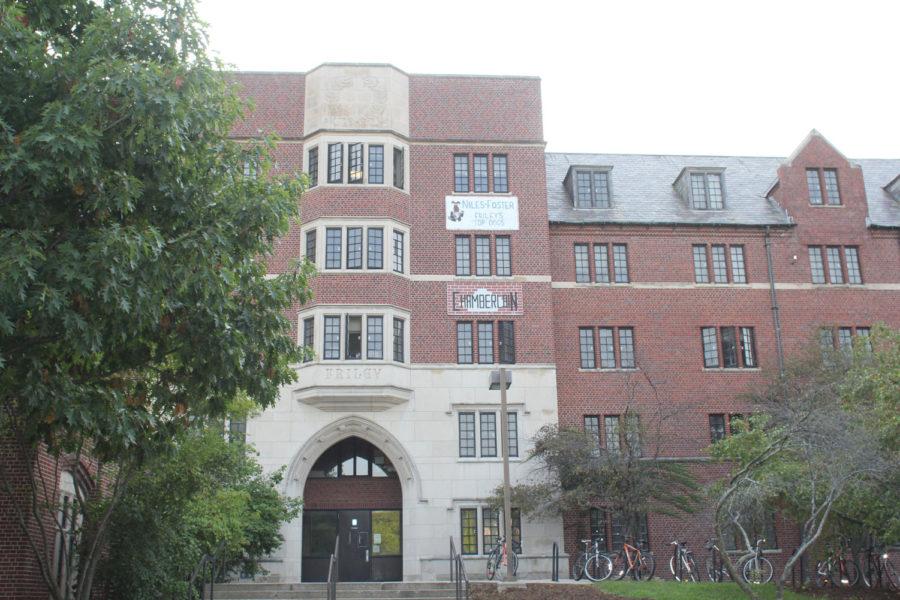- App Content
- App Content / News
- News
- News / Politics And Administration
- News / Politics And Administration / Campus
- News / Student Life
Iowa State granted $300,000 for suicide prevention
The Student Wellness Center, which is located in Friley Hall, will be utilizing the $300,000 Garrett Lee Smith Suicide Prevention Grant that Iowa State was awarded this year.
September 4, 2018
Suicide is the second leading cause of death in Americans aged 18 to 24. As this is the age of most college students, suicide prevention is extremely important at universities across the country.
Recently, Iowa State was awarded the Garrett Lee Smith Suicide Prevention Grant for over $300,000 to help build and strengthen infrastructure to be proactive for students struggling with suicidal thoughts and actions.
The Garrett Lee Smith Grant is in memoriam to Garrett Smith, a college student who struggled with mental illness and alcohol abuse which led to him commit suicide in 2003.
His father, Gordon Smith, was an Oregon Senator at the time and introduced the bill to provide funding to higher institutions to implement and improve programs for mental health and substance abuse awareness and suicide prevention.
President George W. Bush signed the Garrett Lee Smith Memorial Act on Oct. 21, 2004, authorizing $82 million to be used to fund youth suicide prevention programs on campuses across the nation.
According to the website, the purpose of the grant is “to facilitate a comprehensive public health approach to prevent suicide in institutions of higher education. The grant is designed to assist colleges and universities in building essential capacity and infrastructure to support expanded efforts to promote wellness and help-seeking of all students.”
Including Iowa State, 18 institutions received this grant this year. Director of Student Health and Wellness Mark Rowe-Barth says he wasn’t expecting to hear anything until September, but got a surprise one morning.
“On July 25th, I woke up that morning and as usual I checked my email and there it was,” Rowe-Barth said. “[The email] said we were receiving the grant.”
The grant is for $306,000 and the university will be receiving $102,000 each September for the next 3 years.
According to Rowe-Barth, the grant requires that the university fund at least four “activities” with the grant and Iowa State chose six. These activities are goals implemented for the program.
The first activity is to build an infrastructure and to make a team specifically for substance abuse and suicide prevention within Student Wellness.
The second activity is to train students, staff and faculty on awareness of suicide and substance abuse. Among these programs is Campus Connect — a basic program that helps at-risk students and educates students on available resources.
This second activity is also focusing on faculty response. An eight hour training session will be held to teach faculty on how to respond in situations regarding mental health and substance abuse in order to prevent any associated problems.
The third activity is administering mental health screening. This is part of what Rowe-Barth referred to as the SBIRT (Screen, Brief Intervention, Referral, Treatment) process to help at risk students.
“We want to work with staff you wouldn’t ordinarily think of like academic advisors and work on things like motivational interviewing,” Rowe-Barth said.
An outreach program will be the fourth funded activity. The program will raise awareness of all resources available to students if they are struggling with suicidal thoughts, mental health issues or abuse of drugs. The program will work with Student Government to disseminate information to students about who they can talk to if someone they know is in trouble.
The fifth activity is going to be the hiring of a new position on campus. A committee is being formed to select someone to be hired as a suicide prevention specialist on campus.
“Thankfully because we were informed that we were receiving the grant when we did, we should be able to have the position filled by mid October,” Rowe-Barth said.
The last activity is Student Organization support, which is a goal to help sponsor student organizations like the American Foundation for Suicide Prevention and other student organizations who are focused on encouraging one another.
“The idea here is to really get people together to support one another and really find a way to do the most for students on campus,” Rowe-Barth said.
With a new suicide prevention specialist on campus, a stronger infrastructure and a better support system, Rowe-Barth says this is helping in a big way and will hopefully stimulate conversation.
“We are humbled by this opportunity to be part of the conversation and to really help students the most,” Rowe-Barth said.
If you or someone you know is struggling, call the Suicide Prevention Hotline at 1-800-273-8255 or if in an emergency situation, call 911.







